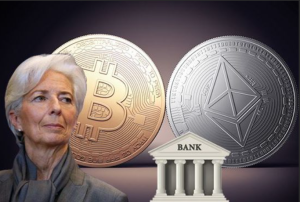Join Our Telegram channel to stay up to date on breaking news coverage
The International Monetary Fund (IMF) has referred to the implosion of the cryptocurrency exchange FTX and the chaos in the banking sector in its push for the regulation of digital assets.
IMF Issues Its Global Financial Stability Report
The report comes after a “Global Financial Stability Report” on April 11, where the IMF renewed calls for “comprehensive and consistent regulation and adequate supervision.” Notably, authorities were on red alert after the failure of crypto firms in 2022 and the subsequent collapse of pro-crypto banks Silicon Valley Bank (SVB) and Signature Bank.
According to the financial agency, regulation for entities within the crypto asset playing field should include the storage, transfer, exchange, and custody of reserves for digital assets. On this note, the IMF underscores that “strict prudential requirements” would have to be implemented for stablecoin issuers.
An excerpt from the report reads:
[Silicon Valley Bank] ‘s spillover from the core financial sector reverberated across the crypto ecosystem and financial institutions exposed to it.
Further, the report notes that the bank’s failure “resulted in a de-pegging of two stablecoins (Circle USDC and Dai). These held uninsured deposits in the bank and the unexpected closure of Signature Bank of New York. According to the IMF, that was because investors developed concern over its footprint in the cryptocurrency sector.
The events add to the list of questions about the viability of digital assets while at the same time underscoring the need for appropriate regulation.
Clear communication by central banks is vital to minimize economic and financial uncertainty, and using separate tools to achieve monetary policy and financial stability goals can address multiple challenges at once. https://t.co/FbiSNdCpVd #GFSR #IMFpublications pic.twitter.com/rCBJQEyi6Y
— IMF (@IMFNews) April 11, 2023
Furthermore, the IMF report notes that 2022 was a rough year for the crypto market, drawing reference to the collapse of Sam Bankman-Fried’s crypto empire. Nevertheless, it acknowledges the failures of Do Kwon’s Terraform Labs and Alex Mashinsky’s Celsius Network, among others, that came before the bank’s Chapter 11 filing. Based on the report, however, the “rough year for crypto” takes most of the blame for creating a “significant contagion” in the ecosystem.
Nevertheless, the IMF reported that the impact outside the crypto playing field resulting from the aforementioned collapses was largely “limited.”
Not The First Time The IMF Criticizes Crypto
Noteworthy, this is not the first time the International Monetary Fund is criticizing cryptocurrencies and digital assets. In February, the IMF’s executive board supported a policy framework that disregarded the recognition of crypto as a legal tender.
Notwithstanding, members have reportedly inclined toward regulating digital assets instead of flatly banning them.
IMF To Publish Its Own Recommendations
In closing, the IMF has committed to publishing its own recommendations. Here, it will propose for regulatory and supervisory approaches for overseeing the crypto asset category in 2023, including stablecoins.
In a February report, the G20 noted that the board would release “a synthesis paper” to integrate the macroeconomic and regulatory perspectives of cryptocurrency assets. This is expected to take effect in September courtesy of the G20 and IMF collaboration.
Read More On Crypto Regulation:
- Chinese Private Firms Shift Focus Away from US while Singapore Establishes Crypto Regulations
- G7 to Work Together on Stricter Crypto Regulations
- Investor’s Outflow Delays Crypto Regulations In Australia
Join Our Telegram channel to stay up to date on breaking news coverage


